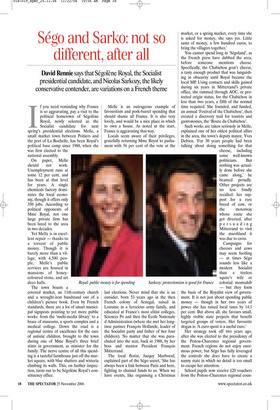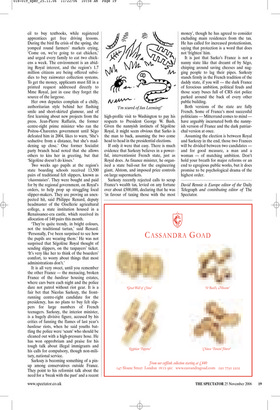Ségo and Sarko: not so different, after all
David Rennie says that Ségolène Royal, the Socialist presidential candidate, and Nicolas Sarkozy, the likely conservative contender, are variations on a French theme If you need reminding why France is so aggravating, pay a visit to the political hometown of Ségolène Royal, newly selected as the Socialist candidate for next spring’s presidential elections. Melle, a small market town between Poitiers and the port of La Rochelle, has been Royal’s political base camp since 1988, when she was first elected to the national assembly.
On paper, Melle should not work. Unemployment runs at some 12 per cent, and has been at that level for years. A single chemicals factory dominates the local economy, though it offers only 350 jobs. According to political opponents of Mme Royal, not one large private firm has been lured to the area in two decades.
Yet Melle is in excellent repair — thanks to a torrent of public money. Though it is barely more than a village, with 4,500 people, Melle’s public services are housed in mansions of honeycoloured stone, and art deco halls.
The town boasts a covered market, an 11th-century church and a wrought-iron bandstand out of a children’s picture book. Even by French standards, there are a lot of smart municipal signposts pointing to yet more public works: from the ‘multi-media library’ to a brace of museums, a sports complex and a medical college. Down the road is a regional centre of excellence for the care of autistic children, brought to the town during one of Mme Royal’s three brief stints in government, as minister for the family. The nerve centre of all this spending is a tasteful farmhouse just off the market square, with blue shutters and wisteria climbing its walls. This, on further inspection, turns out to be Ségolène Royal’s constituency office. Melle is an outrageous example of favouritism and pork-barrel spending that should shame all France. It is also very lovely, and would be a nice place in which to own a house. As noted at the start, France is aggravating that way.
Locals seem aware of their privileges, gratefully returning Mme Royal to parliament with 56 per cent of the vote at the last elections. Never mind that she is an outsider, born 53 years ago in the then French colony of Senegal, raised in Lorraine in a ferocious army family, and educated at France’s most elitist colleges, Sciences Po and then the École Nationale d’Administration (where she met her longtime partner François Hollande, leader of the Socialist party and father of her four children). No matter that she was parachuted into the seat, back in 1988, by her boss and mentor President François Mitterrand.
The local florist, Jacquy Marboeuf, explained part of the Ségo secret. ‘She has always been a link between Paris and here, fighting to channel funds to us. When we have events, like organising a Christmas market, or a spring market, every time she is asked for money, she says yes. Little sums of money, a few hundred euros, to bring the villagers together.’ You cannot spend long in ‘Ségoland’, as the French press have dubbed the area, before someone mentions cheese. Specifically, the Chabichou goat’s cheese, a tasty enough product that was languishing in obscurity until Royal became the local MP. Using contacts and skills gained during six years in Mitterrand’s private office, she rammed through AOC, or protected origin status, for the Chabichou in less than two years, a fifth of the normal time required. She founded, and funded, an annual ‘Festival of the Chabichou’, then created a discovery trail for tourists and gastronomes, the ‘Route du Chabichou’.
Such works are taken seriously in Melle, explained one of her oldest political allies in the area, the town’s deputy mayor, Yves Debien. ‘For 30 years people had been talking about doing something for that cheese, including some well-known politicians. But nothing was actually done before she came along,’ he beamed proudly. Other projects are no less fondly recalled: her support for a rare breed of cow, or the motorway whose route she got diverted, after persuading Mitterrand to visit the marshland it was due to cross.
Campaigns for cheeses and cows may seem footling — at times Ségo sounds less like a modern Socialist than a tireless squire’s wife or colonial memsahib — but they form the basis of the Royalist view of government. It is not just about spending public money — though in her two years of power she has raised local taxes by 14.3 per cent. But above all, she favours small, highly visible state projects that benefit targeted groups of voters. Her favourite slogan is: ‘A euro spent is a useful euro.’ Her strategy took off two years ago, after she was elected to the presidency of the Poitou-Charentes regional government. French regions do not enjoy enormous power, but Ségo has fully leveraged the controls she does have to create a nanny state in which no detail is too small to escape her attention.
School pupils now receive £20 vouchers from the Poitou–Charentes regional coun cil to buy textbooks, while registered apprentices get free driving lessons. During the bird flu crisis of the spring, she yomped round farmers’ markets crying, ‘Come on, we’re going to eat chicken,’ and urged every family to eat two chickens a week. The environment is an abiding Royal interest, and the region’s 1.7 million citizens are being offered subsidies to buy rainwater collection systems. To get the money, applicants must fill in a printed request addressed directly to Mme Royal, just in case they forget the source of the largesse.
Her own deputies complain of a chilly, authoritarian style behind her flashing smile and short-skirted glamour, and of first learning about new projects from the press. Jean-Pierre Raffarin, the former centre-right prime minister who ran the Poitou–Charentes government until Ségo defeated him in 2004, likes to warn, ‘She’s seductive from a distance, but she’s maddening up close.’ One former Socialist party branch head noted that she allows others to kiss her in greeting, but that ‘Ségolène doesn’t do kisses.’ Two weeks ago pupils at the region’s state boarding schools received 13,500 pairs of traditional felt slippers, known as ‘charentaises’. They were bought and paid for by the regional government, on Royal’s orders, to help prop up struggling local slipper-makers. They are proving an unexpected hit, said Philippe Renard, deputy headmaster of the Oisellerie agricultural college, a state institution housed in a Renaissance-era castle, which received its allocation of 140 pairs this month.
‘They’re quite trendy, in bright colours, not the traditional tartan,’ said Renard. ‘Personally, I’ve been surprised to see how the pupils are wearing them.’ He was not surprised that Ségolène Royal thought of sending slippers, on the taxpayers’ ticket. ‘It’s very like her to think of the boarders’ comfort, to worry about things that most administrations don’t.’ It is all very sweet, until you remember the other France — the menacing, broken France of the banlieue housing estates, where cars burn each night and the police dare not patrol without riot gear. It is a fair bet that Nicolas Sarkozy, the frontrunning centre-right candidate for the presidency, has no plans to buy felt slippers for large numbers of French teenagers. Sarkozy, the interior minister, is a hugely divisive figure, accused by his critics of fanning the flames of last year’s banlieue riots, when he said youths battling the police were ‘scum’ who should be cleaned out with a high-pressure hose. He has won opprobrium and praise for his tough talk about illegal immigrants and his calls for compulsory, though non-military, national service.
Sarkozy is becoming something of a pinup among conservatives outside France. They point to his reformist talk about the need for a ‘break with the past’ and a recent high-profile visit to Washington to pay his respects to President George W. Bush. Given the nannyish instincts of Ségolène Royal, it might seem obvious that Sarko is the man to back, assuming the two come head to head in the presidential elections.
If only it were that easy. There is much evidence that Sarkozy believes in a powerful, interventionist French state, just as Royal does. As finance minister, he organised a state bail-out for the engineering giant, Alstom, and imposed price controls on large supermarkets.
Sarkozy recently rejected calls to scrap France’s wealth tax, levied on any fortune over about £500,000, declaring that he was ‘in favour of taxing those with the most money’, though he has agreed to consider excluding main residences from the tax. He has called for increased protectionism, saying that protection is a word that does not ‘frighten’ him.
It is just that Sarko’s France is not a nanny state like that dreamt of by Ségo, chirping around saving cheeses and nagging people to lag their pipes. Sarkozy stands firmly in the French tradition of the daddy state, if you will — the dark France of ferocious ambition, political feuds and those scary buses full of CRS riot police parked around the back of every other public building.
Both versions of the state are fully French. Some of France’s most successful politicians — Mitterrand comes to mind have arguably incarnated both the nannyish version of France and the dark patriarchal version at once.
Assuming the election is between Royal and Sarkozy in the end, those two Frances will be divided between two candidates and for good measure, a man and a woman — of matching ambition. Don’t hold your breath for major reforms or an end to egregious public works, but it does promise to be psychological drama of the highest order.
David Rennie is Europe editor of the Daily Telegraph and contributing editor of The Spectator.



























































































 Previous page
Previous page